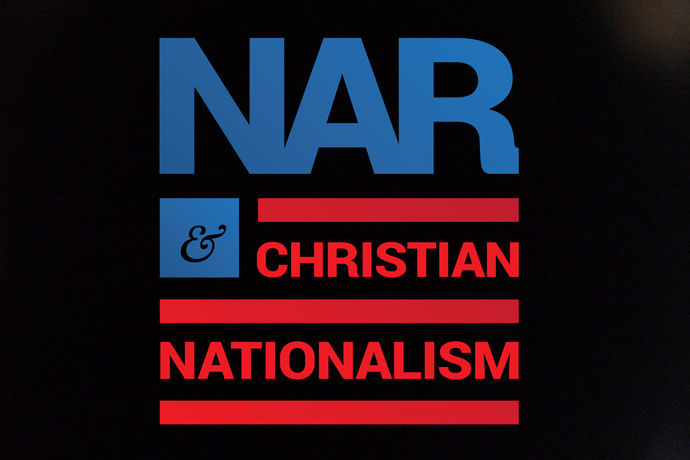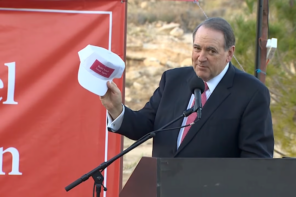Some of the leaders of the New Apostolic Reformation—the dynamic edge and fresh movement of much of neo-charismatic and Pentecostal Christianity in the 21st Century—have revealed their movement to be in disarray. Over 60 leaders have signed a statement distancing themselves, not only from the movement they lead, but from some of its main principles and many of their longtime fellow NAR leaders as well.
The NAR & Christian Nationalism statement comes a year-and-a-half after the principal authors, Apostle Joseph Mattera and Dr. Michael L. Brown spearheaded the publication of the Prophetic Standards (which we reported on here at RD). The Standards manifesto addressed controversies surrounding failed political prophecies concerning Trump’s re-election.
This new statement is remarkable in many ways, and we will highlight a few of them here. But it’s especially notable for its serial leveling of strawmen: no facts are cited and no names are included in response to ideas and events about which we can only speculate. Arguably, they’re leveling an entire strawman army, apparently in hopes of not creating rifts in the NAR that can never be healed. By slaying the strawmen in this way, and engaging in rhetorical cosplay with critics and the media, they place their differences with their NAR colleagues in a colorful but meaningless display of solidarity, giving them space to address one another, if anyone is so inclined.
The 60-plus signatories of this declaration aren’t marginal faction fighters, but are among the movement’s top leaders, including John Kelly, Convening Apostle of the (International Coalition of Apostolic Leaders (ICAL), (one of the legacies of movement founder C. Peter Wagner); and Joseph Mattera, Convening Apostle of the United States Coalition of Apostolic Leaders (USCAL), which is part of ICAL.
Nevertheless, a number of notable figures who signed the Statement on Prophetic Standards are missing from the NAR & Christian Nationalism statement—further indication of a rift. These include Apostles Abby Abildness, Negiel Bigpond, James W. Goll, and Steven Strang, along with Prophets Stacey Campbell, and Kris Vallotton, to name a few.*
The new statement opens with an explanation for its genesis:
“In light of the controversy surrounding the terms “New Apostolic Reformation” (NAR) and “Christian Nationalism,” we are issuing this statement of clarification.”
While there certainly is controversy around these terms, the statement adds more confusion than clarification. And, in early media coverage the statement’s authors (Mattera and Brown) have been characterized as “Moderates in the movement,” though their stated agenda is profoundly revolutionary by any reasonable standard.
NAR denial
Perhaps the most remarkable feature of this document is the effort of some of the founders and leaders to distance themselves from the movement they founded and continue to lead. They do this by pretending that the name of the movement isn’t really the name; its agenda isn’t really its agenda; and that the evidence for these things isn’t easily verified by anyone willing to take the time to look.
The claim that their name is not their name is strangely buried in a footnote.
- By “NAR” we are referring to a phrase coined by several leaders in recent years to describe what they perceive as a new church reformation led by apostolic leaders. Because “NAR” means different things to different people, both positive and negative, we wanted to clarify what we do believe and distance ourselves from what we do not believe.
Let’s unpack the notion that it was a “phrase coined by several leaders in recent years.” In fact, it’s been there since the founding leaders, including Wagner and (statement signer) Kelly, organized it in 1999. Wagner spelled out what it means in his 2008 book Dominion! How Kingdom Action Can Change the World. He applied the term broadly to the global apostolic movement, and not just to those within the apostolic coalition he and Kelly, et al convened and the apostolic networks that comprise it.
For his part, Kelly to this day teaches courses (here for example), in which he states,
“The New Apostolic Reformation is a move of God that is sweeping the earth today, and it is important that we understand it, for it is ushering a new era in church history.”
One of the main features of this contemporary movement is the emphasis on the five-fold ministry outlined in Ephesians 4:11: Apostles, Prophets, Evangelists, Pastors and Teachers. But the statement departs from how these church offices are usually understood. The statement claims that Ephesians 4:11 is only about ministry “functions” in the Church today. The statement turns the nouns into adjectives and defines “apostolic” and “prophetic” leaders according to their “function” (i.e., church planters, networkers, movement leaders, individuals who declare the mind of God, etc.). These “functions” are also said to apply not just to Pentecostals or charismatics.
The term “office” isn’t used, despite the fact that Kelly’s International Coalition of Apostolic Leaders (ICAL) clearly believes there is such a thing as the “office” of Apostle, as defined by Wagner who distinguished between the gift and the office of apostle (see p. 43 of Mark Pfeifer’s book Apostles Then & Now on the ICAL website).
ICAL also clearly states that, “only those who have previously been recognized as having the gift and office of apostle are accepted as members.” The same goes for Convening Apostle Joseph Mattera’s United States Coalition of Apostolic Leaders (USCAL), where their statement of faith speaks specifically of the “fivefold ministry offices”:
We believe that Christ Himself has bestowed upon certain men and women of His choosing the spiritual gifting of Apostles, Prophets, Evangelists, Pastors and Teachers. These five offices constitute the eldership of the Church whose function is to cooperate in spiritually equipping and activating believers for effective service in every sphere of life, including the marketplace, political, education, media, arts, family and church… Their objective is to establish the Kingdom of God on earth.
The signatories don’t acknowledge, let alone explain, why they’re distancing themselves from their own history and the very church offices that define their movement. But they do offer a few clues—less in light of what they say they’re for (nothing really new there), than in what they say they’re against. And while they don’t name anyone, it’s not hard to deduce whom they’re distancing themselves from in light of the prominent roles other NAR leaders have played in the Trump campaigns, Stop the Steal, and the January 6th insurrection.
This is important because the authority that derives from the only biblically identified offices of the Church is essential for setting the direction of the Christian community and getting others to follow. Will the people who set the direction of the church be patient revolutionaries or egotistical demagogues hell bent on biblical revolution in our time?
The authors of the new statement may be concerned they’ve already lost the power struggle to the latter, and are therefore seeking to downplay the significance of the most powerful offices in the Church as they see it.
Dominionism denial
The signatories of the statement on NAR & Christian Nationalism assert,
“WE REJECT the triumphalist, top-down, take-over of society as part of a so-called ‘dominion mandate,’ also noting that we do not know of any major Christian movement that espouses such a top-down, take-over mentality.”
This is a restatement of old-fashioned Dominionism denial in the form of a strawman argument. It’s true that the Dominionism of Rushdoony, and later Wagner, doesn’t call for the armed seizure of the citadels of power and influence, including the Seven Mountains. It is, however, unambiguous about the need for biblical Christians of the right sort to take power in a bottom-up fashion to ultimately govern society in general and all of its parts.
Of course, some are more impatient than others on bringing about the Kingdom of God on earth and engage against what they see as the demonic forces impeding them. Thus the rift in the NAR in this regard is less about ends than means.
Lance Wallnau explains in his book, Invading Babylon: The 7 Mountains Mandate, that Christians have left the mountains “for the devil to dominate because (they) have failed to see (their) roles as healers and deliverers.” Christians are seen as kings that “have authority to administrate over the earth and all demonic opposition.”
Wagner believed that “Satan has deployed high-ranking demonic powers to darken the spiritual atmosphere over society.” The mountains are understood to be held by cosmic powers (see Ephesians 6:12) who must be defeated. For Wagner, “victorious eschatology fits dominion theology like a hand in a glove.” This is reflected in the statements of faith of both ICAL and USCAL which assert, respectively, that:
“each believer has been divinely assigned a sphere of influence that they must bring under the dominion of Christ.”
And that:
“no public official or corporate officer can function effectively without the knowledge of God’s will as revealed in His Word. His every purpose must be to establish or further the Kingdom of Jesus on earth.”
In discussing his vision for USCAL, Joseph Mattera said “we need to influence the other mind-molding sectors of society [i.e. mountains] if we are to dictate the direction of culture…” It’s important to note that ICAL, on their own website endorses the Coalition on Revival’s positions expressed in its 17 Worldview Documents, which were created in the 1980s after years of dialog among hundreds of evangelical leaders (including Wagner and Rushdoony) to arrive at what they understood to be their “biblical worldview.”
Nevertheless, the signatories declare,
“WE DENY any affiliation with what is presently characterized as “NAR” in many circles of both Christian and secular press.”
This is a curious stance since they are the living legacy of the movement some of them helped to found. Casting themselves as just ordinary Christians doing nothing but promoting the gospel, service to others, and “Christian patriotism”—is a brazen effort at damage control.
And, in keeping with the right-wing playbook, they blame those with the audacity to take them at face value—i.e. the media—for their plight,
“WE ALSO RECOGNIZE that some media outlets put the worst construction on our words, take us out of context, falsely associate us with dangerous, fringe groups, and unfairly malign us.”
Of course, they offer no factual support for their complaint, nor do they say what it is these unnamed media outlets have done.
The fact is that they share considerable blame for the politically-crazed, theocratically-inclined, and violence-prone movement they’ve fostered and quietly tolerated for all these years. To this day they’re unwilling to call even the worst of their movement to account, even after January 6th, in which many NAR leaders were involved.
What’s more, Apostle Mattera himself has been a central figure in creating the Christian Right of today. He was one of 150 signers of the Manhattan Declaration in 2009, along with other evangelical leaders, Christian Right activists, 50 sitting prelates of the Roman Catholic Church and a few Orthodox and Mormons. This manifesto established a three-point common political agenda for the Christian Right: “Life, Marriage, and Religious Liberty.” Mattera also served on the “steering committee” that brought a thousand evangelical leaders to New York to hear out Donald Trump, who was by then, the clear GOP candidate for president in 2016.
That this group now objects to the idea of Christian nationalism, and ignores the active promotion of a Christian revisionist history by the likes of David Barton for decades, is pretty weak tea. They nevertheless now seek to distance themselves from it by recognizing that the conflation of the church and the state is “spiritually dangerous,” as is making “a human being into a political savior” and becoming “as vulgar and rude as the candidates we follow.”
But in fact, they offer a highly original definition,
“As for ‘Christian nationalism,’ WE RECOGNIZE that for some, this simply refers to a healthy form of Christian patriotism, of loving God and loving one’s country. In that sense, the term is benign.”
This is a clever argument, but it’s also a claim that’s hard to evaluate because people who simply love God and their country don’t usually refer to themselves as Christian patriots, let alone Christian nationalists. The authors also fail to explain why it’s necessary to segregate Christian patriotism from, say, Buddhist patriotism, Muslim patriotism or atheist patriotism as if patriotism necessarily assumes a religious identity. Used in this way, it smacks of Christian supremacism.
They contrast this “benign” Christian nationalism with what they call “extreme Christian nationalism,” and they denounce and “unequivocally deny any affiliation with or connection to… calls to violent, armed resistance in the name of Christian nationalism or as an alleged means of advancing the cause of the gospel.”
In fairness, they also say,
“WE BELIEVE that God made one human race expressed through different ethnicities and races, all of which deserve dignity and respect as His image bearers, WE REJECT all ideologies and movements claiming ethnic or racial superiority.”
But they don’t say what, if anything, they or anyone else should do about it.
These complaining leaders of the NAR appear to be attempting to deflect attention from fair and reasonable criticisms pointed in their direction, and in the direction of their close colleagues in ICAL, USCAL and in the wider apostolic movement. This is particularly remarkable since it’s the likes of Lance Wallnau, Ché Ahn, Cindy Jacobs, Chuck Pierce, Lou Engle, and Abby Abildness who are currently drawing this unwanted attention to the NAR—and yet all go unnamed in the Statement.
This may be a further indication of the growing rifts in the NAR. It’s surprising that Apostle Steven Strang would sign (or that he would even be allowed to sign) the statement when his Charisma Media company sponsors the demagogic ReAwaken America Tour led by Michael Flynn.
One might reasonably suspect that Apostles Ché Ahn, Dutch Sheets and Prophet Lance Wallnau did not sign on, since they’ve been prominent in the Trump campaign, the Jan. 5th rally, the Jericho March, and Stop the Steal. Sheets and Wallnau have also been featured speakers at a FlashPoint event last July in Atlanta, Georgia reciting the Watchman Decree, which is profoundly marked with Christian nationalist themes.
Many organizations, institutions and movements do not thrive, if they survive at all, when their founder passes. Wagner did his best to try to ensure a smooth transition so that his legacy would not only endure, but thrive. He delegated key functions to trusted leaders, including Ché Ahn, Chuck Pierce and John Kelly, who do not agree on the matters at stake in the Prophetic Standards and the Statement on the NAR and Christian Nationalism. The co-signers of the latter clearly aren’t looking for a fight. But it also seems clear that this statement will probably go unheard by the likes of Wallnau, Sheets, Pierce, Jacobs and Abildness who seem to have already made their choices clear.
Correction: R. Loren Sandford’s name has been removed from this list as he passed away in September. RD regrets the error.





